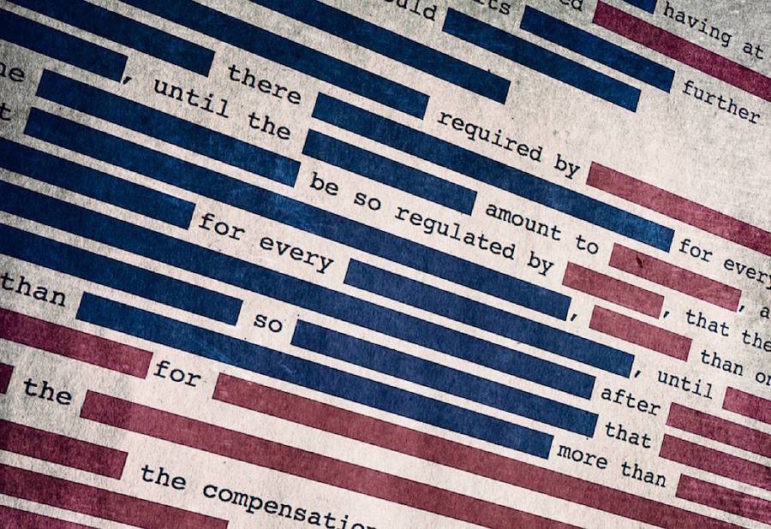

Writers Under Surveillance: Hunter S Thompson’s FBI Files
Writers are dangerous. They have ideas. The proclivity of writers for ideas drove the FBI to investigate many of them — to watch them, follow them, start files on them.
 Writers under Surveillance gathers some of these files, giving readers a surveillance-state perspective on writers including Hannah Arendt, Allen Ginsberg, Ernest Hemingway, Susan Sontag and Hunter S Thompson.
Writers under Surveillance gathers some of these files, giving readers a surveillance-state perspective on writers including Hannah Arendt, Allen Ginsberg, Ernest Hemingway, Susan Sontag and Hunter S Thompson.
Obtained with Freedom of Information Act requests by MuckRock, a nonprofit dedicated to freeing American history from the locked filing cabinets of government agencies, the files on these authors are surprisingly wide ranging; the investigations were as broad and varied as the authors’ own works.
James Baldwin, for example, was so openly antagonistic to the state’s security apparatus that investigators followed his every move. Ray Bradbury, on the other hand, was likely unaware that the Bureau had any interest in his work. (Bradbury was a target because an informant warned that science fiction was a Soviet plot to weaken American resolve.) Ernest Hemingway, true to form, drunkenly called the FBI Nazis and sissies.
The files have been edited for length and clarity, but beyond that everything in the book is pulled directly from investigatory files. Some investigations lasted for years, others just a few days. Some are thrilling narratives. Others never really go anywhere. Some are funny, others quite harrowing. Despite the federal government’s periodic admission of past wrongdoing, investigations like these will probably continue to happen. Like all that seems best forgotten, the Bureau’s investigation of writers should be remembered. We owe it to ourselves.
Following is an extract from the book.
Embed from Getty Imageswindow.gie=window.gie||function(c){(gie.q=gie.q||[]).push(c)};gie(function(){gie.widgets.load({id:’rFJlf3hqTgt2fmYdIpFEhw’,sig:’bNTOhIlBUJrBN-Zt1Iwtnwfo1pDlVxLcF-HG-MwYl6I=’,w:’594px’,h:’396px’,items:’871379774′,caption: true ,tld:’com’,is360: false })});
Hunter S Thompson
According to the FBI, some of their records on Hunter S Thompson, counterculture journalist and Gonzo investigator, may have been destroyed in purges in 1994 and 1998; the the rest were sent over to the National Archives and Records Administration, vault of historically-relevant materials from federal agencies across the government. What remains in the available 58 pages reveal that the agency’s interest in the drug-toting Doctor began before his hit Fear and Loathing in Las Vegas, starting with his coverage of the Hell’s Angels motorcycle gang.
Thompson first came across the Bureau’s radar around the time of the 1967 publication of his book about riding along with the Hell’s Angels motorcycle gang. Thee collection revved up with Thompson’s 1970 entry into the Pitkin County, Colorado sheriff’s race — “despite the natural horror of seeing myself as the main pig.” The inquiry involved on-the-ground interviews, including with the local liquor store clerk.
Confidential informants in Colorado provided additional background for the agency, and a note from one of Thompson’s Kentucky-based childhood acquaintances labeled him as “the bad boy of our neighborhood.” There also appear a few of the Aspen Wall Posters he used for his campaign, highlighting version No 4 and its critique of law enforcement, including a swastika in place of the “x” in then-President Richard Nixon’s name.
However, the Bureau didn’t go so far as to cover Thompson’s death, seemingly a suicide conducted at the man’s kitchen table, the moment at which his FBI file became subject to public disclosure.
DV.load(“https://www.documentcloud.org/documents/4995387-Hunter-S-Thompson-Writers-Under-Surveillance.js”, {
responsive: true,
sidebar: false,
text: false,
pdf: false,
container: “#DV-viewer-4995387-Hunter-S-Thompson-Writers-Under-Surveillance”
});
 GIJN-member MuckRock is an innovative news site that specializes in using the U.S. Freedom of Information Act (FOIA). Founded in 2010, the Somerville, Mass.-based nonprofit assists journalists, researchers, activists, and citizens in filing requests and then uses the released documents to create original investigative reports and analysis. Follow them on Twitter @MuckRock.
GIJN-member MuckRock is an innovative news site that specializes in using the U.S. Freedom of Information Act (FOIA). Founded in 2010, the Somerville, Mass.-based nonprofit assists journalists, researchers, activists, and citizens in filing requests and then uses the released documents to create original investigative reports and analysis. Follow them on Twitter @MuckRock.









